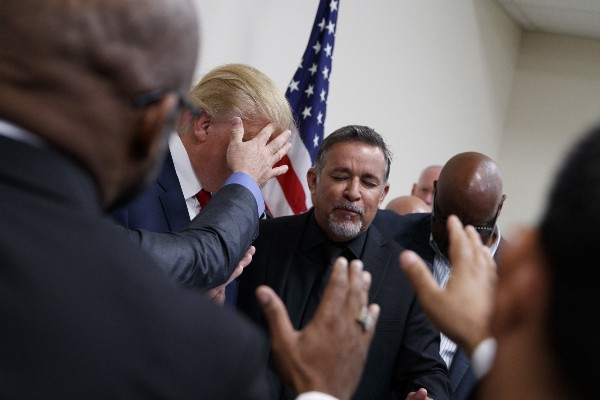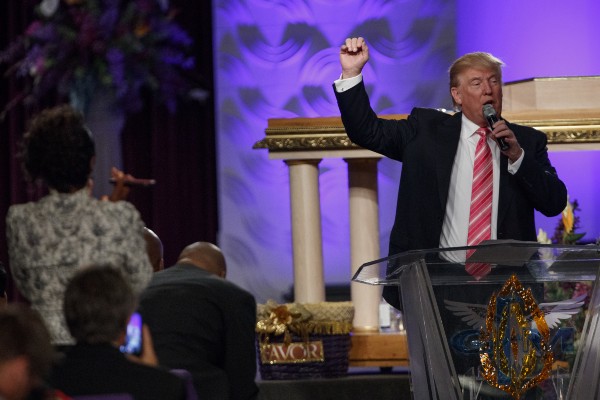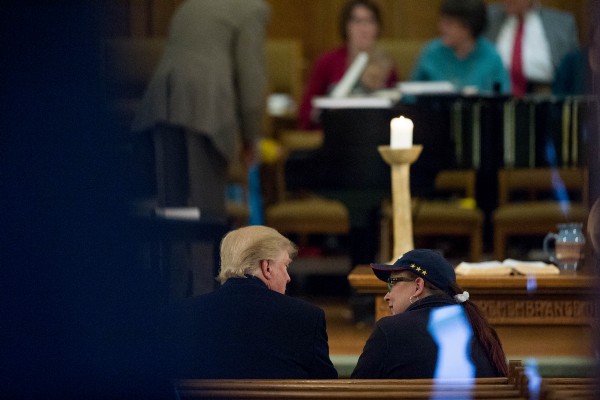When Rev. Tony Suarez was asked to join Republican presidential nominee Donald Trump’s Evangelical Executive Advisory Board in June, he was hesitant. A passionate supporter of Sen. Marco Rubio’s White House bid, the the pastor and vice president of the National Hispanic Christian Leadership Conference had railed against the businessman during the primary.
“The only thing more embarrassing than his campaign is watching preachers support Trump and even manipulate scripture to invent false prophecies regarding Trump,” Suarez said in a November 2015 Facebook post, which has since been deleted.
Eventually, however, Suarez agreed to join the board, whose members are not required to endorse Trump. Like many members, Suarez remained largely silent on the subject over the next few months, often leaving it ambiguous as to whether or not he would ultimately back Trump on Election Day.
“Not only am I a deplorable, but I’m a Latino for Trump.”
But all of that changed this past weekend.
Although still coping with the sudden and tragic death of his wife just two weeks prior, Suarez took the stage during a Trump rally at Regent University to publicly endorse the candidate for the first time.
“Not only am I a deplorable, but I’m a Latino for Trump,” he said, sparking cheers from the crowd. “They say we don’t exist.”
Indeed, Suarez’s newfound passion for Trump seems inexplicable. Hispanic voters in swing states such as Florida overwhelmingly support Hillary Clinton, with only 12.9 percent saying they would back Trump in the Sunshine state — a man who called immigrants “rapists” when announcing his campaign for president. Meanwhile, a growing number of evangelicals — especially religious people of color — are abandoning Trump, saying recently released recordings of him bragging about sexual assault disqualify him from the presidency.

But in his first interview since formally endorsing Trump, Suarez told ThinkProgress that his reasoning for backing The Donald is complex, and offered a rare window into the thoughts of those who continue to support the businessman’s struggling campaign.
Suarez also provides a glimpse into the mindset of some conservative-leaning Hispanic evangelicals, an emerging political force that some claim numbers around 16 million people. More importantly for party strategists, it’s a group that has yet find a permanent political home: according to Suarez, of the 27 percent of the Latinos who voted for Mitt Romney in 2012, more than 50 percent were Hispanic evangelicals.
It’s all about abortion (and the Supreme Court)
Suarez implied that his endorsement of Trump has less to do with the candidate himself and more to do with the larger Republican Party platform he represents — especially its stance on abortion, “religious liberty” concerns, and the desire to put conservative justices on the Supreme Court.
The core of his support for Trump, Suarez said, stems from his religiously fueled opposition to abortion — an increasingly common refrain among evangelicals who remain dedicated to the real estate mogul.
“I’ve actually seen Trump evolve on some issues.”
“Secretary Clinton has stated her position on abortion, and it’s not changing. It’s not going away. There is no wiggle room,” he said. “After hearing her discuss that subject time and time again, and hearing her position on late term abortion, there is just no way that I could support her.”
Suarez said the discussion about abortion at the third presidential debate helped him make his “personal choice” about who to endorse.
“Through this time I’ve actually seen Trump evolve on some issues,” he said. “But there is no evolution for Hillary.”
As evidence of Trump’s “evolution,” Suarez pointed to the GOP nominee’s new, ostensibly softer approach to immigration reform that he adopted during a speech in August. In the address, Trump appeared to walk back his earlier promise to create a “deportation force” to round up the 11 million undocumented immigrants living in the United States, implying that he would focus on removing those with criminal records instead.

But Trump contradicted his own “moderate” approach to deportation within hours, telling CNN’s Anderson Cooper later that day that immigrants without criminal records still had a “good chance” of being deported were he to become president. Meanwhile, Trump has yet to rescind his controversial and reviled plan to build a massive wall along the U.S.-Mexico border to keep out undocumented immigrants.
When pressed on this, Suarez admitted he harbors misgivings regarding Trump’s stance on immigration, but said he still sees possibility for improvement—as long as Trump maintains a circle of advisors who think differently from him.
“I don’t believe he’s everywhere where I would like him to be on immigration reform, for sure,” he said. “[But] I believe that there are opportunities to be at table with him.”
Trump as Zacchaeus?
Suarez insisted Trump’s ideological malleability was crucial, as it would allow him to be influenced by outsiders were he to become president. He justified this approach by citing the biblical example of Zacchaeus, a rich and widely hated tax collector that Jesus converted in the Gospel of Luke.
“My conviction is that there is wisdom in the council of the multitude,” he said. “There was a man that the community hated in the Bible named Zacchaeus. Jesus was willing to go to his house and have a conversation. And a conversation led to a conversion. But while the conversation was taking place, the multitude was outraged that Jesus would even go to his house. [They said]: ‘How dare you eat with that man? Don’t you know what he did to us? Don’t you know what he’s guilty of?’ But that conversation led to a change.”

“My hope has been during these different conversations with Mr. Trump, and being a part of that advisory board, that there will be a change,” he added. “I can’t say here is proof one to and three just yet, but I do believe that something good can come out of that.”
Many of Suarez’s fellow evangelicals are frustrated by the candidate’s lack of change, however. Some champions of the Religious Right such as Russell Moore, head of the Southern Baptist Convention’s political arm, have opposed Trump since the beginning, and others rescinded their support for the candidate after the Washington Post released a video this month of Trump bragging about sexual assault.
Suarez said he has “high respect” for Moore and others, but disagreed with conservatives threatening to choose a third party candidate come November.
“From a practical standpoint, [independent candidate] Gary Johnson is not going to rise up from being seven percent in the polls to winning the White House,” he said. “That’s just not going to happen. If the numbers were different, then maybe you could say there is a legitimate third option — but there isn’t.”
Matters of (contentious) faith
Despite the goading of Suarez and others, Trump’s faith circle has yet to help the famously gaffe-ridden candidate articulate a consistent faith message during his campaign. Trump is notorious for bungling spiritual discussions: he was unable to name his favorite part of the Bible, bungled a biblical reference while speaking at Liberty University by citing “two Corinthians,” and suggested that he doesn’t ask God for forgiveness because he doesn’t believe he is making mistakes. Trump even got into an dispute with Pope Francis after the pontiff responded to a question about the businessman by saying, “A person who thinks only about building walls, wherever they may be, and not building bridges, is not Christian.”
Suarez, for his part, said he believes Trump is a person of faith.
“I do believe he loves God. I believe he’s been born again. I believe he is a young Christian — a baby Christian at that.”
“I believe he is a Christian,” he said. “I do believe he loves God. I believe he’s been born again. I believe he is a young Christian — a baby Christian at that. But that’s my opinion. I don’t know.”
“He’s not trying to be something he’s not,” he added. “He’s a work in progress … It’s a slow progression.”
Suarez did not defend Trump’s comments on the infamous tape in which he brags about sexually assaulting women, however — distancing himself from other members of the advisory board such Michele Bachmann who attempted to explain away the comments as “bad boy talk.” He said he hadn’t heard the recordings himself, as his wife passed away when the scandal surfaced. But he said he’d read enough about their content to rebuke them.
“I can’t defend [the comments],” he said. “No one can. I don’t think it’s fair to disregard the comments. I don’t want to do that. It’s wrong.”
